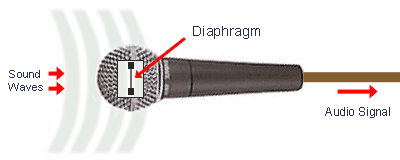Brachot Through a Microphone: Difference between revisions
(Created page with "File:Microphone.gif|200px|framed|right|In the head of the microphone, there is diaphragm, that vibrates when hit by sound waves. These vibrations are converted into an elect...") |
No edit summary |
||
| Line 1: | Line 1: | ||
[[File:Microphone.gif| | [[File:Microphone.gif|100px|framed|right|In the head of the microphone, there is diaphragm, that vibrates when hit by sound waves. These vibrations are converted into an electrical current which in turn is converted to the audio signal.]] | ||
<p style="text-indent: 2em">Does one fulfill one's obligation of a bracha if one hears a bracha through a microphone? Rav Moshe Feinstein (Igrot Moshe 2:108 and 4:91:4) writes that it seems that one could fulfill any mitzvah, which one fulfills through speech, by hearing it amplified by a microphone. He notes, though, that this leniency would not apply to [[Kriyat Shema]] or [[Birkat HaMazon]]. He reasons that since the voice is heard as a direct and immediate result of the speaker it is considered like regular speech and not an echo. Even though the microphone converts the sound waves into an electrical signal which is then used to produce amplified sound waves, the resulting sound waves should be considered no different than regular sound waves that are creates as a person speaks. He concludes with hesitation being that he is unfamiliar with the mechanism of microphones.</p> | <p style="text-indent: 2em">Does one fulfill one's obligation of a bracha if one hears a bracha through a microphone? Rav Moshe Feinstein (Igrot Moshe 2:108 and 4:91:4) writes that it seems that one could fulfill any mitzvah, which one fulfills through speech, by hearing it amplified by a microphone. He notes, though, that this leniency would not apply to [[Kriyat Shema]] or [[Birkat HaMazon]]. He reasons that since the voice is heard as a direct and immediate result of the speaker it is considered like regular speech and not an echo. Even though the microphone converts the sound waves into an electrical signal which is then used to produce amplified sound waves, the resulting sound waves should be considered no different than regular sound waves that are creates as a person speaks. He concludes with hesitation being that he is unfamiliar with the mechanism of microphones.</p> | ||
Revision as of 05:11, 14 October 2013
Does one fulfill one's obligation of a bracha if one hears a bracha through a microphone? Rav Moshe Feinstein (Igrot Moshe 2:108 and 4:91:4) writes that it seems that one could fulfill any mitzvah, which one fulfills through speech, by hearing it amplified by a microphone. He notes, though, that this leniency would not apply to Kriyat Shema or Birkat HaMazon. He reasons that since the voice is heard as a direct and immediate result of the speaker it is considered like regular speech and not an echo. Even though the microphone converts the sound waves into an electrical signal which is then used to produce amplified sound waves, the resulting sound waves should be considered no different than regular sound waves that are creates as a person speaks. He concludes with hesitation being that he is unfamiliar with the mechanism of microphones.
